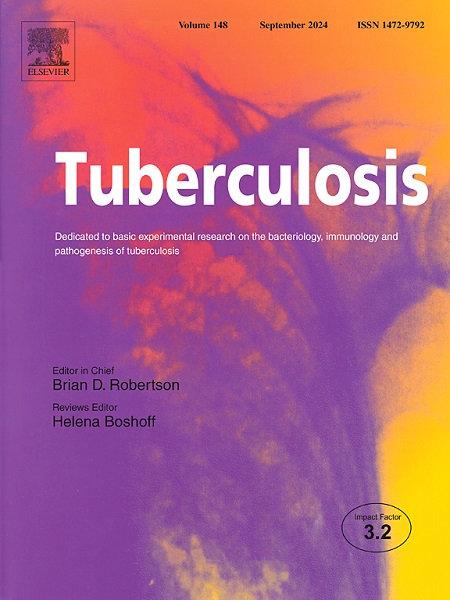布洛芬的抗分枝杆菌潜能
IF 2.9
3区 医学
Q3 IMMUNOLOGY
引用次数: 0
摘要
背景布洛芬(IBU)是一种非处方镇痛药,属于非甾体抗炎药类。它被广泛用于治疗疼痛、发烧和炎症。为了确定 IBU 对结核分枝杆菌(Mtb)的抗菌潜力,我们进行了硅学和体外实验。方法使用 STITCH v.5 管道分析 IBU 与 Mtb H37Ra 和 H37Rv 菌株蛋白质组的相互作用。用GFP标记的卡介苗(Bacillus Calmette Guerin,BCG)和td-tomato标记的Mtb H37Ra来测定IBU的抑菌和杀菌活性。IBU处理的THP-1衍生巨噬细胞分别被td-番茄标记的Mtb H37Ra和野生型卡介苗感染,以分析IBU对细菌吞噬和细胞凋亡的影响、细胞色素 p450 系统中的 Cyp-123、Cyp-126、Cyp-130 和 Cyp-139 。在体外,浓度不断增加的 IBU 对 Mtb H37Ra 有明显的抑菌作用,尤其是 100 μg/ml 和 200 μg/ml 浓度的 IBU 几乎完全抑制了细菌的生长。IBU 处理不会影响卡介苗诱导的 THP-1 巨噬细胞的凋亡,但会显著增强细菌的吸收,尤其是在 100 μg/ml 和 200 μg/ml 的浓度下。本文章由计算机程序翻译,如有差异,请以英文原文为准。

The anti-mycobacterial potential of ibuprofen
Background
Ibuprofen (IBU) is a non-prescription analgesic drug from the non-steroidal anti-inflammatory drug class. It is widely used for treating pain, fever, and inflammation. Both the in silico and in vitro experiments were performed to determine the antibacterial potentials of the IBU against Mycobacterium tuberculosis (Mtb).
Methods
The STITCH v.5 pipeline was used to analyze the interaction of IBU with the proteome of the Mtb H37Ra and H37Rv strains. The GFP-tagged Bacillus Calmette Guerin (BCG) and td-tomato-tagged Mtb H37Ra were used to determine the bacteriostatic and bactericidal activities of IBU. The IBU-treated THP-1-derived macrophages were infected by td-tomato-tagged Mtb H37Ra and wild-type BCG to analyze the effects of IBU on bacterial phagocytosis and apoptosis, respectively.
Results
The in-silico study revealed that the IBU interacts with Mtb proteins primarily involved in cellular process, metabolism, and virulence, and targets four virulent proteins of Mtb, e.g., Cyp-123, Cyp-126, Cyp-130, and Cyp-139 in the cytochrome p450 system. The increasing concentrations of IBU showed significant bacteriostatic activity against Mtb H37Ra in vitro, where the 100 μg/ml and 200 μg/ml concentrations especially led to almost complete bacterial growth arrest. The IBU treatment does not affect BCG-induced apoptosis of THP-1-derived macrophages, but significantly enhances bacterial uptake, especially at 100 μg/ml and 200 μg/ml concentrations.
Conclusions
The IBU enhances Mtb uptake by macrophages and exhibits direct bacteriostatic activity in vitro.
求助全文
通过发布文献求助,成功后即可免费获取论文全文。
去求助
来源期刊

Tuberculosis
医学-呼吸系统
CiteScore
4.60
自引率
3.10%
发文量
87
审稿时长
49 days
期刊介绍:
Tuberculosis is a speciality journal focusing on basic experimental research on tuberculosis, notably on bacteriological, immunological and pathogenesis aspects of the disease. The journal publishes original research and reviews on the host response and immunology of tuberculosis and the molecular biology, genetics and physiology of the organism, however discourages submissions with a meta-analytical focus (for example, articles based on searches of published articles in public electronic databases, especially where there is lack of evidence of the personal involvement of authors in the generation of such material). We do not publish Clinical Case-Studies.
Areas on which submissions are welcomed include:
-Clinical TrialsDiagnostics-
Antimicrobial resistance-
Immunology-
Leprosy-
Microbiology, including microbial physiology-
Molecular epidemiology-
Non-tuberculous Mycobacteria-
Pathogenesis-
Pathology-
Vaccine development.
This Journal does not accept case-reports.
The resurgence of interest in tuberculosis has accelerated the pace of relevant research and Tuberculosis has grown with it, as the only journal dedicated to experimental biomedical research in tuberculosis.
 求助内容:
求助内容: 应助结果提醒方式:
应助结果提醒方式:


